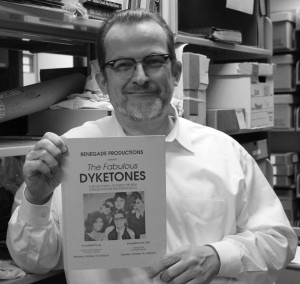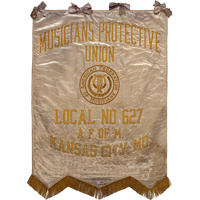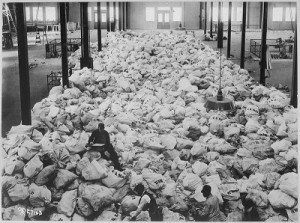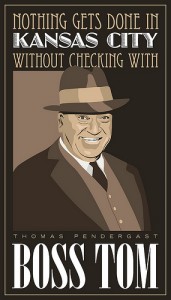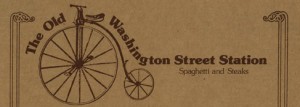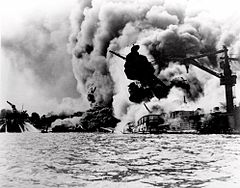 In commemoration of Pearl Harbor day, I thought it might be nice to share with you what glimpse the Arthur B. Church collection offers us of how Kansas Citians reacted to the attack on Pearl Harbor. As you are probably aware, on the morning of December 7, 1941, isolationist sentiment in the United States was dealt a cruel dose of reality by Japanese militarism run amok, thanks to the hypnotic qualities of political syncretism, which had become all the rage at that moment in history.
In commemoration of Pearl Harbor day, I thought it might be nice to share with you what glimpse the Arthur B. Church collection offers us of how Kansas Citians reacted to the attack on Pearl Harbor. As you are probably aware, on the morning of December 7, 1941, isolationist sentiment in the United States was dealt a cruel dose of reality by Japanese militarism run amok, thanks to the hypnotic qualities of political syncretism, which had become all the rage at that moment in history.
Because programming relating to the war within this collection is predominantly composed of coverage following the D-day invasion, we have little formal documentation of reactions to the attack on Pearl Harbor. Nevertheless, recordings of normal everyday news coverage of local events following December 7 of that year offer us a different and, perhaps, even more interesting lens through which to view this bygone moment of national, but also local trepidation. From the offerings of the collection, this takes the form of words spoken at the Kansas City Man of the Year award ceremony that was held on December 10, 1941—only three days after the attack (to offer a little context, this event fell two days after the United States declared war on Japan, but still a day prior to the declarations of war against Germany and Italy). Although several of those speaking that night broached the subject of war over the course of the roughly 40-minute program, the task of engaging the issue more directly fell to retired Rear Admiral Hayne Ellis of Kansas City, who had recently been designated the city’s Director of Civilian Defense. Although his comments on the coming war were somewhat scattered because they weren’t exactly topical at the award ceremony, they have a certain aggregate coherence and offer a quite plain message, so I have attempted to condense this aspect of his speech as follows:
“Ladies and gentlemen, the bugle call has sounded. In 1942, Kansas City will be a city at war. Kansas City in 1941 was not a war-like city, but it was not a sleeping city either. … Our large steel plants are working day and night to turn out tons and tons of the stuff that we need to lick Japan, yes, and Hitler too. … An industrial future for the Midwest in postwar days has been assured. And what is more important, we of Missouri and Kansas will be able to play a part in the industrial side of winning the war. … 1941 is almost over. Now bring on 1942. 1941 has been a year of peace and progress. 1942 will be an era of death and destruction. But we of Kansas City and we of America have met challenges and responsibilities before. We will not shake from them now. I know something about the caliber of our ships and men in the Pacific. I know something about our adversary, who three days ago struck with such a ruthless, premeditated and cowardly blow. I know something about you— you Kansas City men and women who will work and worry and sacrifice from now on. And lastly I know that, come what may, whether it be weeks, in months, or in years, the ultimate victory will be ours.”
We today might be inclined to wonder how Americans living in such dark times were able to cope with the dread of impending war, but the message to be taken away from both the retired admiral’s talk and the audience’s positive reception of it seems rather clear. The evidence offered by this artifact from the airwaves suggests that the prevailing attitude—at least among residents of Kansas City—was one of steadfastness and optimism.
Dustin Stalnaker, KMBC Project staff/History (MA) student
Like this:
Like Loading...
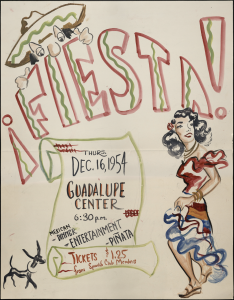 r 15, a time to recognize the contributions of Hispanic and Latino Americans in Kansas City and all over the nation and to celebrate their heritage and culture. Here is a blast from the past depicting the annual Fiesta at the Guadalupe Center, 1954. This year’s Fiesta was held at the Barney Allis Plaza in September, a tradition that continues to enrich the cultural fabric of our diverse community.
r 15, a time to recognize the contributions of Hispanic and Latino Americans in Kansas City and all over the nation and to celebrate their heritage and culture. Here is a blast from the past depicting the annual Fiesta at the Guadalupe Center, 1954. This year’s Fiesta was held at the Barney Allis Plaza in September, a tradition that continues to enrich the cultural fabric of our diverse community.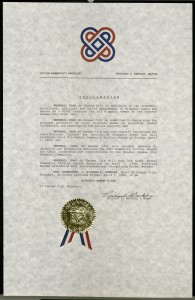 ment, community service and advocacy. MANA also seeks to increase the opportunities and education of all Latinas. They are informed activists and a support system for their members.*
ment, community service and advocacy. MANA also seeks to increase the opportunities and education of all Latinas. They are informed activists and a support system for their members.*
